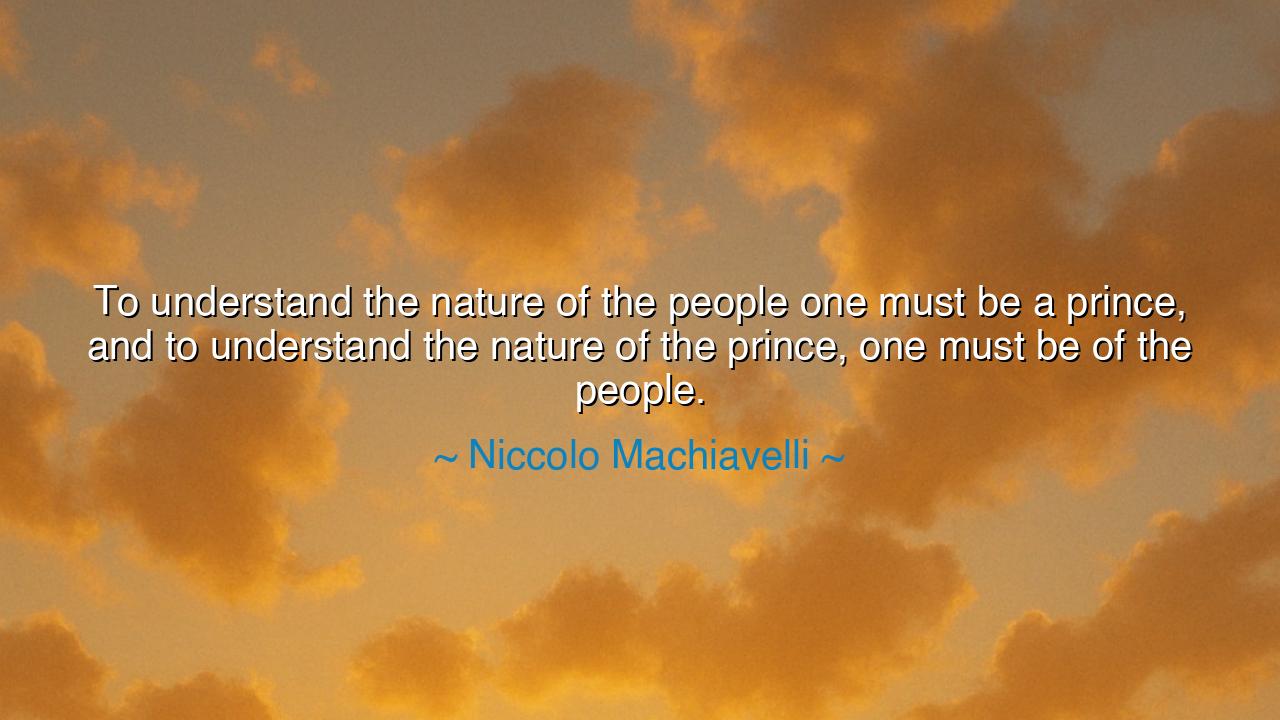
To understand the nature of the people one must be a prince, and
To understand the nature of the people one must be a prince, and to understand the nature of the prince, one must be of the people.






Hearken, O seekers of wisdom, to the piercing words of Niccolò Machiavelli, who proclaimed: “To understand the nature of the people one must be a prince, and to understand the nature of the prince, one must be of the people.” Within this seemingly paradoxical decree lies the eternal dance of power and empathy, a meditation on the delicate balance between ruler and ruled, authority and humility. The ancients, who chronicled the deeds of kings and philosophers, would recognize in these words a timeless truth: that mastery over the affairs of men requires both the vision of the sovereign and the grounded understanding of the common heart.
Machiavelli, born in 1469 in Florence, wrote in a time of political turbulence, where kingdoms rose and fell like the tides. His treatises, most famously The Prince, dissect the mechanisms of power, influence, and governance. Yet here, he speaks not merely of strategy, but of human nature, revealing that the art of ruling is inseparable from the art of knowing. A prince ignorant of his people’s desires, fears, and virtues is as blind as a ship without a rudder; likewise, one who despises or dismisses leadership cannot grasp the burdens and intricacies of command.
Consider the first half of the maxim: “To understand the people, one must be a prince.” Here lies the counsel that authority itself grants perspective. The ruler sees the consequences of policy, the mechanics of order, and the strains upon society in ways inaccessible to ordinary citizens. From the elevated seat of responsibility, the prince perceives the collective will, the currents of discontent, and the sparks of loyalty. Yet such insight is potent only when wielded with prudence, for power untempered by virtue may blind the ruler to the subtle cries of the people.
Conversely, the second half whispers a complementary truth: “To understand the prince, one must be of the people.” Here lies the mirror of empathy. Only those who have walked among the many, tasted hardship, and borne the burdens of ordinary life can discern the trials and vulnerabilities that afflict a sovereign. Just as the sage in the marketplace comprehends commerce, or the soldier in the ranks understands the battle, the people are uniquely positioned to perceive the prince’s motives, anxieties, and frailties. Leadership is thus a bridge between heights and depths, and understanding traverses both.
History provides living echoes of Machiavelli’s insight. Consider Abraham Lincoln, who rose from modest beginnings among the people of Kentucky to guide a nation through its most perilous hour. Lincoln understood the fears, hopes, and labors of common citizens, for he had been one of them. Yet, as President, he also bore the burdens of authority, the weight of civil war and moral decision, which allowed him to comprehend the stakes and responsibilities of leadership. Through this dual vision, he navigated the perils of governance with wisdom and compassion.
The lesson is profound: to lead wisely, one must cultivate both power and humility, authority and empathy. The nature of men is complex, and the bonds of society delicate. To know the governed is to appreciate their hearts; to know the ruler is to fathom the weight of command. Without both, judgment falters, justice wavers, and stability is fragile. Machiavelli’s words illuminate the path of balanced understanding, where insight flows from both elevated perspective and grounded experience.
Practical guidance emerges from this reflection. Whether in governance, business, or daily life, seek to understand both sides of every relationship. Step into the shoes of those you guide, as well as the responsibilities that guide you. Observe, listen, and measure with care, for wisdom is born in the intersection of authority and empathy, not in the isolation of either. Strive to bridge the chasm between the elevated and the ordinary, and cultivate discernment that honors both.
Thus, O seeker, engrave this truth upon your heart: the mastery of life, like the governance of a realm, demands the dual vision of the prince and the people. To perceive the world in its fullness, to act with justice, and to guide with wisdom, one must inhabit both realms. Let this duality shape your deeds, temper your judgments, and illuminate the path of leadership, empathy, and enduring insight, for it is in understanding both the heights and the depths that true guidance is born.






AAdministratorAdministrator
Welcome, honored guests. Please leave a comment, we will respond soon